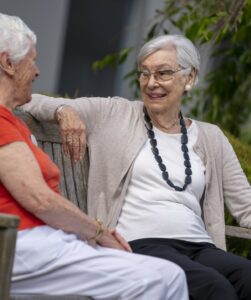
By Bonnie Robinson
With lockdowns across the world and no one going anywhere much, media beauty pages have struggled for relevance.
One topic they have been focusing on is the reality that for lockdown, mid-life women (and I guess a few men), the decision about whether and when to go grey has become a moot point.
Headlines like ‘grey renaissance’, ’embrace the grey’ and ‘XYZ (insert celebrity of choice) relishes their new grey look’ abound.
Now you might think that, as CEO of an organisation that provides services to older people and promotes positive ageing, I’d welcome this focus on greying hair. Yes and no.
While it’s great to see some grey hair in the media, you only have to read the first one or two paragraphs of most articles to see that this is generally not about embracing ageing – it’s just another way to let people, especially women, know, that looking older is not a good thing.
Articles begin with the “embrace it” language but quickly move on to show how you can ensure your grey hair looks good so that it doesn’t ‘age you’. Personal stories often talk about how much older they looked once they went grey and what they did to overcome it.
Sure, there are a few ‘I now feel amazing’ comments, but there would be at least two negative comments for one positive comment. You might say, “it’s just an article about hair, trying to sell products, don’t worry about it.”
But every time older people read something that tells them they have to look younger, the message is that they are not okay. And these articles also tell younger people that people who look older (whatever that means) are not okay.
If you think I’m exaggerating, just think for a minute about the compliments we tend to give older people about their appearance. We often say things like “You look great for your age,” “She doesn’t look her age,” or “You don’t look that old”.
Meant in kindness, mostly, but the underlying message is ‘don’t look old’. These subtle undercurrents not only result in people feeling negative about getting older, but also in discrimination.
Because if being older is not okay, then maybe I don’t want to socialise with you, employ you, or treat you like an equal human being who continues to have the same hopes, dreams, joys and sorrows as any human being of any age.
Research has reported high rates of people over 55 experiencing ageism, especially in employment, but also in access to services and in how they get treated generally.
Getting older is a natural and normal part of human existence. We are lucky in Aotearoa New Zealand that we live in a society where most people have a chance to get older.
If this ‘grey renaissance’ is to be a good thing for older people, we need to not just embrace the grey but embrace humanity in all its diversity, which includes our age and how we look.
So, next time you compliment an older person (grey-haired or not), compliment them on how wonderful they are, not how wonderful they look for their age.
Let’s all do our bit to embrace ageing and celebrate this natural part of being human.
- Bonnie Robinson is the CEO of HBH Senior Living









